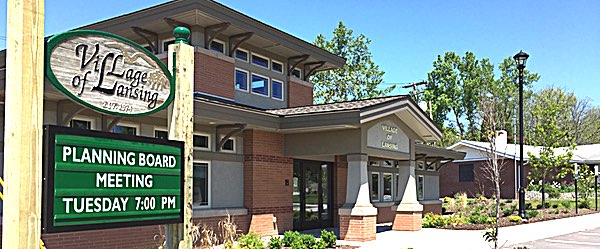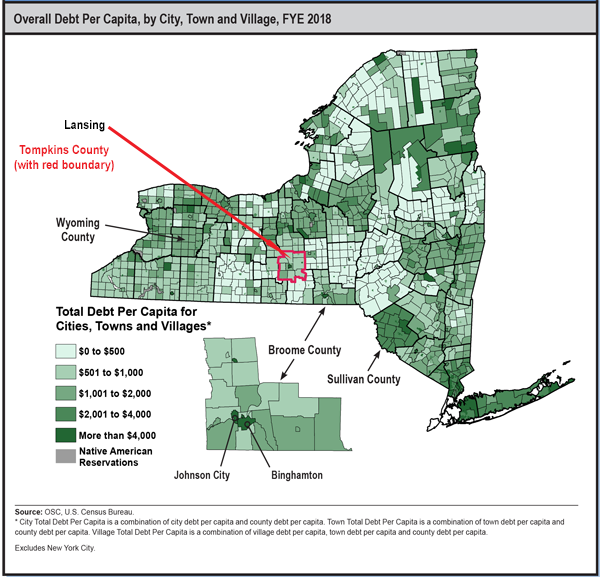- By Dan Veaner
- News
 Print
Print 
The Village of Lansing is officially debt free. Village Clerk/Treasurer Jodi Dake told the Village Trustees Monday that the final $13,500 payment on the Village's only outstanding debt has been paid. While both the Village and Town of Lansing have no general municipal budget debt, the Village is now in the enviable position of having no debt for sewer and water as well.
"We borrowed money 34 years ago for a sewer bond and we finally paid it off," Dake said. "So that's exciting. So the Village has no debt, which is not like most municipalities."
According to the New York State Comptroller's Office, "Properly used, debt plays an essential role in government, providing funds to build schools, hospitals, highways and mass transit. Misused, debt creates a burden that reduces government’s ability to respond to vital needs and unfairly transfers costs to our children and grandchildren."
Both the Village and Town of Lansing budget conservatively, saving for projects beforehand. By not incurring debt taxpayer dollars are saved because there are no interest payments on loans. Both municipalities use reserve funds and have a healthy fund balance that are built up gradually to pay expenses for projects they plan for as well as emergencies.
The Village sewer bond that has now been paid off was for $531,400. Dake says there were a few other bonds in Village history, but all debts have been paid.
"We had a water bond that was in conjunction with Bolton Point that was paid off back in 2001 and in the beginning, when the Village was first formed, there were two different bonds," Dake says. "In 1985 there was a 14 year bond for $186,750 to build the garage & Maintenance Shop ($80,750) and water project ($106,000). In 1985 there was a seven year bond for $405,000 Public Improvement Bond (Pyramid & N Triphammer Roads). But since that time we have been set up reserves and plan for projects so we don't have to borrow money."
Town of Lansing Bookkeeper/Personnel Officer Charmagne Rumgay reports that as of January 1st of this year the Town's debt balance stands at $3,062,715. $298,081.23 of that is for Warren Road Sewer District, and the rest is for water districts and the new Bone Plain Road water tank. Water and sewer districts are paid in fees by people in those districts, and maintain budgets separate from the overall municipal budget. That means that property taxes do not pay for district expenses. Rumgay says the last of the Town's municipal debt was paid for when Scott Pinney was Supervisor, from 2008 through 2012.
The Fire District is the most proactive Lansing taxing authority. Fire Commsioners work from a capital plan that looks 20 years into the future, predicting when capital repairs to fire stations and fire tuck replacements that often cost over $1 million will be needed. District Treasurer George Gesslein says that by paying cash for new fire trucks ahead of time the district receives a significant discount, plus taxpayers are saved interest payments because the District does not incur loans.

The highest local debt per capita in 2018 in the state outside New York City was in Westchester, Nassau, Broome, and Essex Counties, at over $4,500 per capita. Tompkins County is in the middle range. The Comptroller's report shows the County government had $63,700,998 in debt in the fiscal year ending in 2018. The city's debt was $131,361,409 for the same period.
New York City's debt grew 132% over the last two decades to $91.56 billion in the last fiscal year. New York State Comptroller Thomas P. DiNapoli released a report in November that says local governments outside of New York City had $43.6 billion in outstanding debt at the end of the 2018 fiscal year. State-wide local governments paid $5.5 billion in principal and interest in in 2018. Towns in the County owed $19,974,078, and Villages owed $21,935,742. School Districts in Tompkins County had $138,878,720 in debt, and fire districts owed $961,827 for a total county-wide debt of $376,812,774. For that period the debt per capita in Tompkins County was $3,666, which accounted for 5% of taxes.
DiNapoli's report concludes, "In total, local debt outstanding appears to have stabilized since the last recession, after more than a decade of substantial increases. This is largely due to decreases in school district debt levels. Other types of local government, especially counties and fire districts, have continued to increase their total levels of debt."
The Village of Lansing is unique in that it is now entirely debt free, both for its municipal operating expenses and for infrastructure costs like water and sewer, possibly becoming the only, or one of the only New York municipalities with zero debt.
"We're trying to avoid debt," Village of Lansing Deputy Mayor Ronny Hardaway said. "We avoid debt."
v16i6



